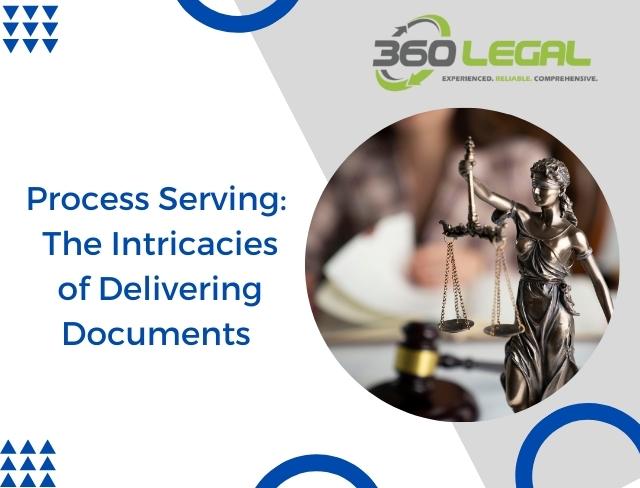The Vital Duty of Process Serving in Court and Legal Process
The Vital Duty of Process Serving in Court and Legal Process
Blog Article
Recognizing the Value of Process Offering in Legal Treatments
Process serving is a fundamental element of lawful procedures that makes certain all celebrations are informed of their legal rights and obligations. By assisting in the official delivery of necessary legal papers, it upholds the principles of due procedure and contributes to the stability of the judicial system. The nuances of efficient procedure offering expand past mere shipment; they encompass legal demands and prospective consequences of incorrect solution. Recognizing these intricacies can significantly influence the results of legal conflicts, triggering a more detailed examination of the practices that underpin this important function.
Interpretation of Refine Offering
Refine serving is a critical part of the legal system, specified as the formal delivery of lawful documents to individuals entailed in a lawsuit. This procedure makes sure that all events are adequately educated of legal actions being taken versus them or to which they are a celebration. Usually, these documents consist of summons, problems, subpoenas, and other court-related documents that require the recipient's attention and feedback.
The relevance of process serving lies in its duty in upholding the concepts of due process. It ensures that people have notice of lawful procedures, thus providing them a possibility to respond or safeguard themselves. Appropriate service of procedure is not merely a step-by-step formality; it is a basic aspect of making certain fairness and openness in the judicial system.
Process offering can be conducted by different individuals, consisting of specialist process-server, police policemans, and even attorneys, relying on jurisdictional laws. Each method of solution has its own requirements and techniques, which are important to avoid hold-ups or terminations within the legal framework. Understanding the meaning and feature of procedure serving is vital for all stakeholders entailed in lawful proceedings.

Legal Demands for Process Serving
Legal demands for procedure offering are necessary to ensure that the shipment of legal files follows developed protocols and is acknowledged by the court. Each jurisdiction has details laws regulating how and when records should be offered, which may include summonses, issues, and subpoenas.
Typically, process-server must be objective 3rd parties who are not associated with the instance. They have to likewise adhere to state policies regarding solution techniques, which can include individual solution, substitute solution, or solution by mail. Personal solution includes delivering records directly to the recipient, while substitute solution enables distribution to one more responsible person at the recipient's residence or place of service.
Furthermore, process-server are usually called for to file an evidence of service, a lawful paper that validates the distribution of papers, with the court. This paper includes information such as the day, time, and approach of service, in addition to the name of the person offered.
Role in the Justice System
A necessary part of the justice system, procedure offering ensures that individuals associated with lawful process are effectively alerted of activities taken versus them (Process Serving). This official alert is critical for upholding the principles of due process, which mandates that parties have the opportunity to react to cases made versus them. Without reliable procedure serving, the legal system would be rendered ineffective, as people can involve in activities without understanding of pending legal matters
Process-server serve an important role in safeguarding the integrity of the lawful procedure. They function as neutral parties, delivering legal files such as summons, complaints, and subpoenas, thus fostering transparency and accountability within the judicial structure. By making certain that all celebrations are notified, process offering assists to avoid any potential unreasonable advantage, enabling for fair involvement in legal process.
Additionally, the professionalism and trust of process-server adds to the public's count on the justice system. Their adherence to moral methods and lawful requirements reinforces the authenticity of the judicial process. Eventually, effective procedure serving is crucial in promoting the regulation of legislation and ensuring that justice is pop over to this web-site obtainable to all individuals associated with legal conflicts.
Consequences of Improper Service
The consequences of incorrect service can considerably threaten the honesty of lawful proceedings. Improper service can result in the accused not being conscious of the lawful activity versus them, which might stop them from reacting suitably or offering their protection.
In addition, improper solution can provide court orders and judgments void, compeling the complainant to reactivate the procedure, which can be both taxing and financially burdensome. It can also unlock to appeals and challenges, as the offender might suggest that they were not appropriately informed of the procedures, complicating the legal landscape further.
Ideal Practices for Effective Solution

2nd, timing plays a crucial role. Serving records immediately can prevent delays in lawful proceedings and guarantee that all events are informed in a prompt way. Additionally, employing a specialist process web server can improve efficiency, as they view it are educated to make certain and navigate possible difficulties conformity with local regulations.
Third, keeping exact records of the solution process is necessary. If conflicts develop pertaining to whether solution was properly implemented., documenting the date, time, and manner of service can offer vital proof.
Verdict
Finally, procedure offering is an important part of lawful procedures, making sure that all celebrations are duly notified and managed wikipedia reference the possibility to react. Following lawful demands and finest methods not only supports the principles of due process yet additionally enhances the stability of the justice system. The repercussions of incorrect service can lead to significant hold-ups and issues, highlighting the requirement for efficient process offering in advertising fairness and ease of access in legal disagreements.
The subtleties of effective process offering prolong beyond plain shipment; they include lawful demands and potential effects of incorrect service.Refine serving is an essential component of the lawful system, defined as the formal distribution of legal records to people involved in a court instance. Without efficient procedure offering, the legal system would certainly be rendered inadequate, as individuals can engage in activities without understanding of pending lawful matters.
Refine servers offer an important duty in securing the integrity of the lawful procedure - Process Serving. The repercussions of inappropriate solution can lead to considerable delays and complications, highlighting the need for efficient process serving in advertising justness and availability in legal disagreements
Report this page